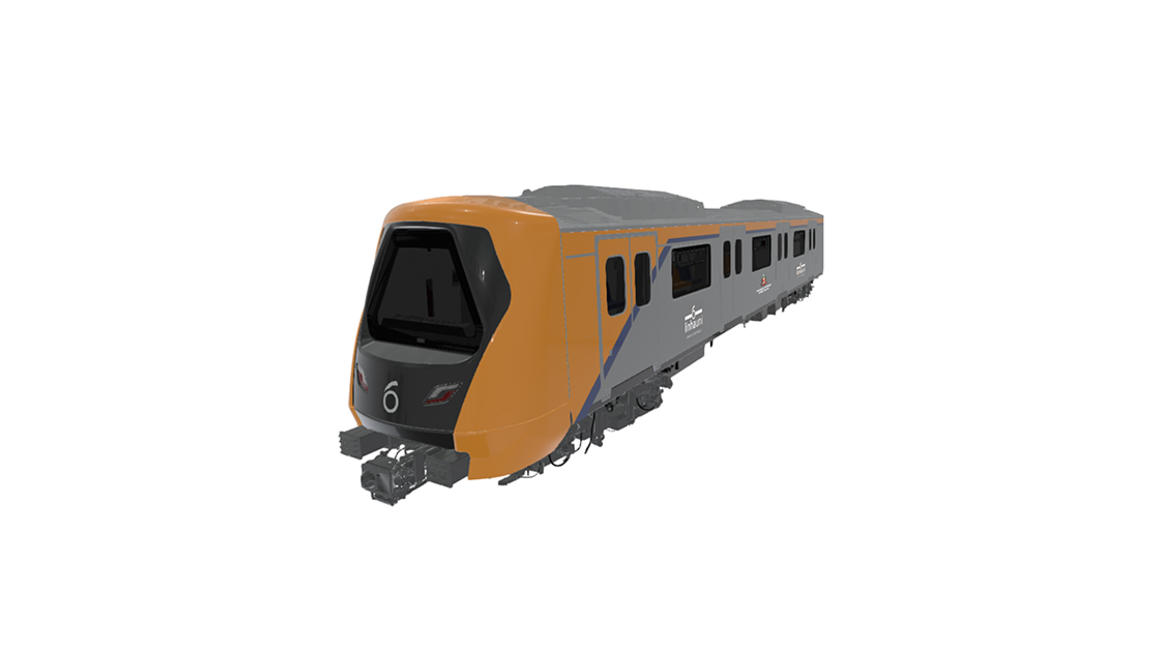
Alstom and Linha Uni unveil the design of Line 6-Orange trains in São Paulo
Alstom and Linha Uni unveil the design of Line 6-Orange trains in São Paulo

Communication Coordinator - Latin America
Vinicius Riqueto
Send an email-
The orange trains reinforce the identity of Line 6
June 26, 2024 - Today Alstom, a global leader in smart and sustainable mobility, and Linha Universidade (LinhaUni), unveiled the design of the trains for Line 6 of the São Paulo (SP) Metro. The brand trains have orange accents, reinforcing the name and identity of the line. The trains are lighter, with lower electricity consumption and a layout developed to offer a better experience for passengers.
The spacing of doors and corridors was designed to provide better passenger flow and freedom of movement, as well as reserved spaces for people with reduced mobility. The large windows and doors will provide a clear view of the outside, guaranteeing a smooth, safe and comfortable journey for passengers. The trains will also feature modern technologies: passenger counting, dynamic line maps, monitors and video surveillance, as well as an optical smoke detection system and fire extinguishing system.

"I am extremely proud to have a project as important as Line 6-Orange in our portfolio. This project, which is a milestone in urban mobility in Latin America both due to its size and innovative financing, is a testament to our ongoing commitment to the State of São Paulo and Brazil."
Made of stainless steel, another characteristic of the trains is their resistance: the structures of the trains last for more than 40 years, in addition to being lighter in weight compared to models made of carbon steel.
Each train will have the capacity to transport up to 2,044 passengers. The line is expected to transport around 633,000 passengers per day. Relying on Unattended Train Operation (UTO) technology, which allows operation without an operator on board, the Line-6 Orange train will be able to reach 90 kilometers/hour.
Twenty-two trains of six cars each will be manufactured at Alstom's industrial unit in the city of Taubaté, state of São Paulo. These cars will be operated and maintained by Linha Universidade (LihaUni), Sao Paulo Metro's concessionaire for Line 6 with a nineteen-year agreement. The first carshells are already in production.
The trains were presented at Alstom's Lab 4.0, a virtual reality laboratory that uses advanced technology to give a realistic user experience in the virtual space. The process allows a detailed look at all aspects, from the shape of the seats and comfort and safety elements to technical elements such as the engine.
"I am extremely proud to have a project as important as Line 6-Orange in our portfolio. This project, which is a milestone in urban mobility in Latin America both due to its size and innovative financing, is a testament to our ongoing commitment to the State of São Paulo and Brazil. Present in Brazil for almost 70 years, we are dedicated to providing public transport solutions that are efficient, safe and of high quality”, says Michel Boccaccio, President of Alstom in Brazil and General Director for Latin America, who adds: “This project reaffirms our mission of promoting a reliable and sustainable transport system, contributing to improving the quality of life of São Paulo residents and, specifically, for students who will use the university line and will not buy a car, a global trend of youth.”
São Paulo metro Line 6-Orange is a concession from the State of São Paulo that includes the construction and operation of a metro line that will connect the neighborhoods of Brasilândia and Freguesia de Ó to the city center. When completed, the project will be 15.3 kilometers long and will have 15 underground stations, including three major interchanges.
The project also foresees a 7-kilometer expansion of Line 6-Orange, adding another six stations: Morro Grande, Velha Campinas; Aclimação, Cambuci; Vila Monumento and São Carlos. The section will be integrated with metro lines 1-Blue and 4-Yellow and metropolitan train lines 7-Rubi and 8-Diamante.
Alstom Taubaté
Opened in 2015, Alstom's industrial unit in Taubaté is a center of excellence in the production of stainless steel cars and is strategically located in an industrial hub, next to two important highways in the country, Dutra and Carvalho Pinto, and close to the Port of Santos, the largest port complex in Latin America.
The unit was responsible for the production of 27 Citadis cars for the Rio de Janeiro tramway, which were manufactured in record time for the Summer Olympics in Brazil, demonstrating Alstom's agility, commitment and customer focus. The project was the second in the world to have a 100% catenary-free system. After the conclusion of the VLT contract, the plant also produced the NS16 cars for the Santiago Metro in Chile.
In November 2022, Alstom inaugurated the expansion of the site after an investment of R$ 100 million that is part of the company's growth strategy after the signing of six national and international contracts. More than 170 trains (over 940 cars) are being produced by Alstom in Taubaté for the cities of São Paulo (Brazil), Santiago (Chile), Taipei (Taiwan) and Bucharest (Romania), highlighting the facility's ability to contribute to mobility at a global level.
ALSTOM™ and Metropolis™ are protected trademarks of the Alstom Group.



